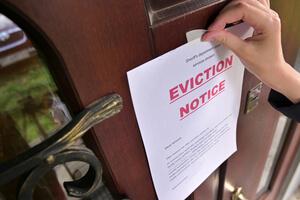1512 Artaius Parkway, Suite 300,
Libertyville, IL 60048
Call for a FREE Phone Consultation
847-549-0000
Video Consultations Also Available
 Spanish
Spanish Cantonese
CantoneseServing Clients Across 7 Illinois Locations
What Is the Eviction Process for Residential Landlords in Illinois?
 Landlords need to be able to earn sufficient income through the property they own in order to make sure they are receiving the appropriate returns on their investments. To protect their financial interests, there are some cases where landlords may need to take action to evict tenants. While a moratorium on evictions was in effect for much of 2020 and 2021 due to the COVID-19 pandemic, this moratorium ended in October of 2021. While there are some cases where landlords may be able to help tenants apply for emergency rental assistance or negotiate lease modifications that will allow tenants to make affordable rent payments, if a workable solution cannot be found, evictions may be necessary. In these situations, landlords will need to make sure they are following the proper procedures during the eviction process.
Landlords need to be able to earn sufficient income through the property they own in order to make sure they are receiving the appropriate returns on their investments. To protect their financial interests, there are some cases where landlords may need to take action to evict tenants. While a moratorium on evictions was in effect for much of 2020 and 2021 due to the COVID-19 pandemic, this moratorium ended in October of 2021. While there are some cases where landlords may be able to help tenants apply for emergency rental assistance or negotiate lease modifications that will allow tenants to make affordable rent payments, if a workable solution cannot be found, evictions may be necessary. In these situations, landlords will need to make sure they are following the proper procedures during the eviction process.
Steps Followed When Evicting Residential Tenants
In most cases, the eviction process will begin when the landlord sends a termination notice to the tenant. In cases involving non-payment of rent, a tenant may be served with a notice that the lease will be terminated in five days if rent is not paid. In cases where a tenant has violated the terms of the lease, such as by damaging the property, a tenant must be served with a notice that the lease will be terminated in 10 days if the issue is not corrected. In cases where a landlord wishes to end a month-to-month lease or a lease that was created through an oral agreement, they will usually be required to provide the tenant with 30 days’ notice.
After the termination of a lease, a landlord can formally begin the eviction process by filing a complaint in court. A hearing will be scheduled where a judge will review the facts of the case and determine whether the eviction should be allowed to proceed. The complaint must be served to the tenant along with a court summons, and the tenant must be served at least three days before the date of the scheduled hearing. After September 13, 2021, a summons must be accompanied by a notice informing the tenant about the availability of Court-Based Rental Assistance. If the tenant does not appear at the eviction hearing, a default judgment may be issued, although the tenant may be able to file a motion to vacate a default judgment within 30 days.
If the judge rules in favor of the landlord, an order of possession will be issued. The landlord can provide this order to the local sheriff, and the date of eviction will be scheduled. On that date, the sheriff will accompany the landlord or their representative to the property, make sure the tenant has vacated the premises, and ensure that the proper procedures are followed when removing any items belonging to the tenant from the property. The landlord will be responsible for entering the property, changing locks, and removing items. The tenant’s belongings must be placed outside or in a suitable location on the property, and they must remain on the property for 24 hours. After that time, the landlord will be responsible for disposing of any remaining items.
Contact Our North Chicago Residential Evictions Lawyers
If you are a landlord who needs to determine how to address non-payment of rent or other lease violations by tenants, Newland & Newland, LLP can help you understand your options and assist with the eviction process. To arrange a free consultation, contact our Lake County landlord representation attorneys at 847-549-0000.
Sources:
https://www.ilga.gov/legislation/ilcs/ilcs4.asp?DocName=073500050HArt%2E+IX&ActID=2017&ChapterID=56&SeqStart=67000000&SeqEnd=75200000
https://www.lakecountyil.gov/2002/Eviction-Process
https://www.illinoiscourts.gov/forms/approved-forms/forms-approved-forms-circuit-court/eviction
 Stop Foreclosure
Stop Foreclosure




















